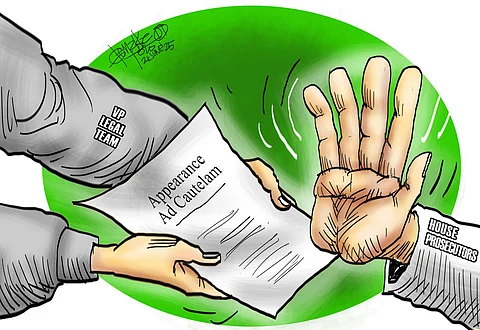
- NEWS
- the EDIT
- COMMENTARY
- BUSINESS
- LIFE
- SHOW
- ACTION
- GLOBAL GOALS
- SNAPS
- DYARYO TIRADA
- MORE

Interesting developments are unfolding between the legal team representing Vice President Sara Duterte and the House prosecutors, providing a preview of the fireworks to come in the impeachment trial.
VP Duterte’s legal team recently submitted an “Appearance Ad Cautelam” to the Senate, which means that the Vice President has acceded to appear in the trial with reservations.
The filing means the VP’s camp, while submitting to the impeachment court summons, reserves the right to challenge the jurisdiction or legitimacy of the process.
The reaction of the House was sophomoric in that it refused to accept the VP’s move, with the handwritten remark “Tender Copy, Refuse to Receive.”
It was suggested, according to a grizzled court veteran, that it was either a deliberate strategy or a misstep, since refusing to receive a formal filing from an opposing party is not standard practice in court procedures.
In a high-stakes process like impeachment, the House’s refusal creates a procedural anomaly that might be taken as obstructing due process or attempting to avoid accountability for procedural shortcomings.
The House panel eluded VP Duterte’s team rather than countering with a legal response or even articulating their objections, appearing to sidestep a confrontation.
Since the House’s role in the trial is to prove guilt, its refusal to accept the filing is a refusal to fulfill its constitutional duty by obstructing a communication between parties.
Worse still, the refusal to engage is widely viewed in the legal community as an attempt to undermine the constitutional structure of the impeachment process.
The silly step was also meant to avoid an official record acknowledging Duterte’s legal challenge, thereby deflecting counterarguments, such as the claim that the House had violated the Constitution by sitting on earlier impeachment complaints to favor a stronger fourth complaint.
VP Duterte has submitted petitions to the Supreme Court, raising the question of the possible violation of the one-year constitutional limit on filing an impeachment complaint.
Two challenges were filed seeking to nullify the impeachment and block the Senate trial, arguing that the House process was unconstitutional.
The ad cautelam move was also seen as tossing the ball to the Supreme Court to be the arbiter of the process’s validity.
The House’s response, however, exposed a lack of preparedness or internal discord.
The aggressive legal maneuver may have caught the House off guard, prompting a defensive reaction rather than a confident countermove, according to a legal expert.
The House’s misstep implies that it will prolong the trial, which could be a significant factor in the anti-Duterte forces’ campaign.
The Senate’s remand, which the House panel also refused to follow, and the prosecutors’ refusal to engage worsened the impasse, presenting uncertainty about how the trial will proceed.
A trial in the 20th Congress is being discussed, but doubts remain since a Supreme Court ruling may alter its fate.
Still, the real agenda is emerging, in which the trial against VP Duterte will be stretched through the prosecution’s maneuvers, targeting to erode the public’s perception of the popular official.
A prolonged political quagmire will seek to negate the “numbers game” in the Senate court, which, at this early stage, has been conceded as acquitting VP Duterte.
